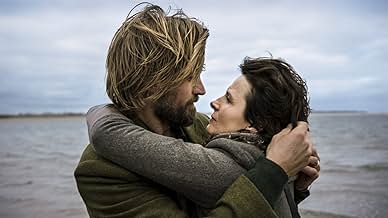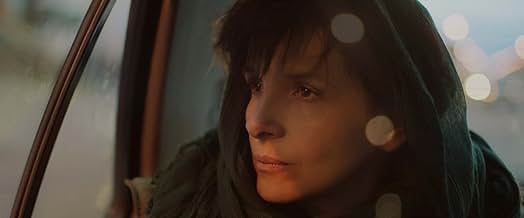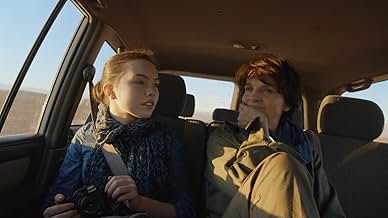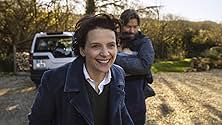IMDb-BEWERTUNG
7,0/10
8347
IHRE BEWERTUNG
Rebecca ist eine der besten Kriegsfotografinnen der Welt. Sie muss einen großen emotionalen Sturm überstehen, als ihr Mann sich weigert, ihr gefährliches Leben länger zu ertragen.Rebecca ist eine der besten Kriegsfotografinnen der Welt. Sie muss einen großen emotionalen Sturm überstehen, als ihr Mann sich weigert, ihr gefährliches Leben länger zu ertragen.Rebecca ist eine der besten Kriegsfotografinnen der Welt. Sie muss einen großen emotionalen Sturm überstehen, als ihr Mann sich weigert, ihr gefährliches Leben länger zu ertragen.
- Auszeichnungen
- 6 Gewinne & 14 Nominierungen insgesamt
Zoubida Akif
- Ariana
- (as Zoubida Afik)
Empfohlene Bewertungen
War photographer Rebecca (Juliette Binoche) is one of the best at her job, obtaining the kind of pictures that invariably get published in western magazines as examples of the violence of conflicts in nonwestern areas such as Afghanistan or Kenya. The only snag is that Rebecca is so obsessed with her work that she cannot understand the damage she is doing to her family back in Ireland, especially her daughter Steph (Lauryn Canny).
The conflict between personal and professional values forms the kernel of Erik Poppe's film. Yet thematically speaking the director is far more interested in prompting reflection on the photographer's trade. While Rebecca certainly shows a good deal of bravery in trying to get the best pictures, we also understand that she is something of a voyeur who actively enjoys intruding into her subjects' personal space. Her fondness for the close-up of suffering people is quite disconcerting, especially in a sequence taking place in the back of an SUV in Afghanistan. In political terms, she adopts a neocolonialist position of the westerner taking scopophilic pleasure in the power she exerts through her camera.
Perhaps the film's most telling moment occurs back in Ireland, when Steph turns the camera on Rebecca and photographs her repeatedly. Rebecca cannot endure the experience of the lens pointing at her in such an intense manner and turns her head away, her eyes filling with tears. Would that Rebecca might understand that her subjects could feel much the same; but if she did so, then she would not be good at her job.
Given the integrity with which Poppe examines this issue, it's rather sad that the film as a whole should be somewhat melodramatic. In the end the action descends into something of a tug-of-love battle between mother and family; at one point Rebecca bundles Steph and her younger sister Lisa (Adrianna Cramer Curtis) in a pathetic attempt to abduct them from their family home. Needless to say husband Marcus (Nikolaj Coaster-Waldau) foils the plot and eventually looks after the girls himself.
The film makes a half-hearted attempt to draw a parallel between Rebecca's wanderlust and the rhythms of the tide (her daughter observes that the photographer is like the sea, coming and going), but unfortunately outstays its welcome: the last half-hour unfolds slowly but predictably towards an inevitable denouement. This is a shame, given the seriousness of its basic premise - almost as if director Poppe had lost the courage of his convictions.
The conflict between personal and professional values forms the kernel of Erik Poppe's film. Yet thematically speaking the director is far more interested in prompting reflection on the photographer's trade. While Rebecca certainly shows a good deal of bravery in trying to get the best pictures, we also understand that she is something of a voyeur who actively enjoys intruding into her subjects' personal space. Her fondness for the close-up of suffering people is quite disconcerting, especially in a sequence taking place in the back of an SUV in Afghanistan. In political terms, she adopts a neocolonialist position of the westerner taking scopophilic pleasure in the power she exerts through her camera.
Perhaps the film's most telling moment occurs back in Ireland, when Steph turns the camera on Rebecca and photographs her repeatedly. Rebecca cannot endure the experience of the lens pointing at her in such an intense manner and turns her head away, her eyes filling with tears. Would that Rebecca might understand that her subjects could feel much the same; but if she did so, then she would not be good at her job.
Given the integrity with which Poppe examines this issue, it's rather sad that the film as a whole should be somewhat melodramatic. In the end the action descends into something of a tug-of-love battle between mother and family; at one point Rebecca bundles Steph and her younger sister Lisa (Adrianna Cramer Curtis) in a pathetic attempt to abduct them from their family home. Needless to say husband Marcus (Nikolaj Coaster-Waldau) foils the plot and eventually looks after the girls himself.
The film makes a half-hearted attempt to draw a parallel between Rebecca's wanderlust and the rhythms of the tide (her daughter observes that the photographer is like the sea, coming and going), but unfortunately outstays its welcome: the last half-hour unfolds slowly but predictably towards an inevitable denouement. This is a shame, given the seriousness of its basic premise - almost as if director Poppe had lost the courage of his convictions.
7OJT
This is Norwegian director Erik Poppe's fourth feature film, and a film which many have had high expectations too. I must say this is a good film, but far from his best. I simply loved "Hawaii, Oslo" and "Troubled waters" which both was pretty much perfect film experiences. The debut film "Schpaa" was also very promising.
The script here is written by Norwegian author and screenwriter Harald Rosenløw Eeg, after a story by Erik Popp which is largely inspired by personal experiences as a war photographer.
We meet the great war photographer Rebecca (Juliette Binoche), living in Ireland, when she's home, that is. Because her relationship with her family is faltering due to her dangerous work, and many days away from home. She follows suicide bombers in Kabul, and rampage killers in Africa. Her husband is a marine biologist (Nicolai Coaster-Waldau), and he is very tired of her not being there, even when she's home. This is also affecting their two daughters.
Make no mistake. This is a good film, but I felt it lacked some tempo. The slow thinking pace may be correct to get the feeling, but the film loses momentum, and could easily be a disappointment for those expecting another Poppe masterpiece. Because this isn't. Well, it's an interesting theme, but what could have been a great drama is slipping away. It's not the actor's fault, because they are doing a great job.
The film is artistically beautiful, and the opening is really something which makes you speculate. I must admit I was a bit disappointed, since I reckon Poppe as the best Norwegian director ever. But this wasn't wholly fulfilling to me.
This won the Special Grand Prize of the jury at the 37th Montréal Film Festival 2013.
The script here is written by Norwegian author and screenwriter Harald Rosenløw Eeg, after a story by Erik Popp which is largely inspired by personal experiences as a war photographer.
We meet the great war photographer Rebecca (Juliette Binoche), living in Ireland, when she's home, that is. Because her relationship with her family is faltering due to her dangerous work, and many days away from home. She follows suicide bombers in Kabul, and rampage killers in Africa. Her husband is a marine biologist (Nicolai Coaster-Waldau), and he is very tired of her not being there, even when she's home. This is also affecting their two daughters.
Make no mistake. This is a good film, but I felt it lacked some tempo. The slow thinking pace may be correct to get the feeling, but the film loses momentum, and could easily be a disappointment for those expecting another Poppe masterpiece. Because this isn't. Well, it's an interesting theme, but what could have been a great drama is slipping away. It's not the actor's fault, because they are doing a great job.
The film is artistically beautiful, and the opening is really something which makes you speculate. I must admit I was a bit disappointed, since I reckon Poppe as the best Norwegian director ever. But this wasn't wholly fulfilling to me.
This won the Special Grand Prize of the jury at the 37th Montréal Film Festival 2013.
Frankly, I never knew what the movie is about. What I expected was a beautiful romantic drama and I got a movie that defined someone's struggle over her passion and its reality. After seeing opening scene I thought it would be another movie about war similar to the '5 Days of War'. I am glad it was so distinct which was partially based on the director own experiential story when he served as a photojournalist in the '80s. It is a jointly produced movie by Ireland and Norway in English language.
Rebecca is a passionate war zone photojournalist and her daring attitude make her one of the finest on the field. Like always her latest journey takes place in the war torn city of Kabul, Afghanistan. She follows a suicide bomber to cover up the story where she gets injured. After the accident the whole story flips back to her home in Ireland where it chronicles the worried husband and the two children who are very affectionate of her. This is the time where she has to choose the side, the professional? Or the family? The stay at home during recovery makes her realize the worth of her life. So the movie's end strikes with the path she opts to travel forth.
''Sometimes it's hard to stay at home. I mean, the one who stays at home has the hardest job.''
Well, it served a message with the touch of melodrama. The story demonstrated family value on the right amount of each others love and care. The opening and the end scenes that take place in Afghanistan was so brutal and there's another one that takes place in Kenya. But bringing the reality on the screen as it happening some places of the world must be appreciated. It kind of makes you realize that someone is sacrificing their life to bring light on what's happening in the war zones. Like always, Juliette Binoche was good. It was her movie, her side of the story told when she was caught between the family who loves and the war that calls her.
One of the fascinating thematic movie. Regarding the main role, you may think why she's not stopping the tragedy from happening. That's the journalism, when you have no power to act, just expose to the rest of the world. The combination of family drama and the conflict zone are like two different genres that brought together awesomely. The director's own experience helped to shape the movie well. Almost all the combat related scenes were so realistic as what he had seen is now letting us know through this film. I think this movie is a must see. The end scene makes us go speechless, woefully.
Rebecca is a passionate war zone photojournalist and her daring attitude make her one of the finest on the field. Like always her latest journey takes place in the war torn city of Kabul, Afghanistan. She follows a suicide bomber to cover up the story where she gets injured. After the accident the whole story flips back to her home in Ireland where it chronicles the worried husband and the two children who are very affectionate of her. This is the time where she has to choose the side, the professional? Or the family? The stay at home during recovery makes her realize the worth of her life. So the movie's end strikes with the path she opts to travel forth.
''Sometimes it's hard to stay at home. I mean, the one who stays at home has the hardest job.''
Well, it served a message with the touch of melodrama. The story demonstrated family value on the right amount of each others love and care. The opening and the end scenes that take place in Afghanistan was so brutal and there's another one that takes place in Kenya. But bringing the reality on the screen as it happening some places of the world must be appreciated. It kind of makes you realize that someone is sacrificing their life to bring light on what's happening in the war zones. Like always, Juliette Binoche was good. It was her movie, her side of the story told when she was caught between the family who loves and the war that calls her.
One of the fascinating thematic movie. Regarding the main role, you may think why she's not stopping the tragedy from happening. That's the journalism, when you have no power to act, just expose to the rest of the world. The combination of family drama and the conflict zone are like two different genres that brought together awesomely. The director's own experience helped to shape the movie well. Almost all the combat related scenes were so realistic as what he had seen is now letting us know through this film. I think this movie is a must see. The end scene makes us go speechless, woefully.
A film about a female investigative journalist is bound to raise a reaction among viewers, especially when the atrocities filmed are so brutal. But that is the point being made by writer/director Erik Poppe (with added written material by Harald Rosenløw-Eeg and Kirsten Sheridan). The main character in this story is Rebecca (a radiant and brilliant Juliette Binoche), one of the world's top war photographers. She must weather a major emotional storm when her husband Marcus (Nikolaj Coaster-Waldau) refuses to put up with her dangerous life any longer. He and their young daughters – especially Steph (Lauryn Canny) but also the much younger Lisa (Adrianna Cramer Curtis) - need Rebecca, who, however, loves both her family and her work. Rebecca has been angry, since a child, over the way people around the globe focus on the detritus of local news and pay little attention to the horrors that occur daily in the countries besieged by terror. Rebecca resolves to take Steph (at Steph's request) to Kenya where inadvertently they witness terrorist acts even though Rebecca had been promised the area was safe. The result of Rebecca's endangering her daughter results in her marriage dissolving, but other changes in Rebecca's smoldering anger and angst result also.
The film is very well photographed and both Binoche and Coaster-Waldau are excellent. The supporting cast is strong (especially a very small bit part for Maria Doyle Kennedy) and the musical score by Armand Amar is deeply moving. The film places before us the incalculable struggles war correspondents face but at the same time it brings to out attention just how impossibly difficult life in troubled countries can be. Grady Harp December 14
The film is very well photographed and both Binoche and Coaster-Waldau are excellent. The supporting cast is strong (especially a very small bit part for Maria Doyle Kennedy) and the musical score by Armand Amar is deeply moving. The film places before us the incalculable struggles war correspondents face but at the same time it brings to out attention just how impossibly difficult life in troubled countries can be. Grady Harp December 14
In a warm sunny day in Montreal I went to watch the very new arrival film "A Thousand Times Good Night". I had no idea how it would be impressive because I could not find much information through the web.
All the people may encounter a paradoxical situation between their family and their job. This fact is more realizable when you are a war photographer. The first scenes of A Thousand Times Good Night are too devastating. You can feel the horror, anger, and self-sacrifice behavior in those Afghan extremists. It seems that the suicide bomber just jumped to her destiny as she had been told to do and in parallel she was scared to death. These paradoxical situations just began from the very first scene and moves through the film. The photographer, Rebecca, had her own dilemmas between her enthusiast and her family life. I think the symbolic scene which shows Rebecca plunging in reverse was frequently displayed to show how it would be difficult to decide in dilemmas. You may watch it or refuse to watch it but it worth to watch because this is life as it is!
All the people may encounter a paradoxical situation between their family and their job. This fact is more realizable when you are a war photographer. The first scenes of A Thousand Times Good Night are too devastating. You can feel the horror, anger, and self-sacrifice behavior in those Afghan extremists. It seems that the suicide bomber just jumped to her destiny as she had been told to do and in parallel she was scared to death. These paradoxical situations just began from the very first scene and moves through the film. The photographer, Rebecca, had her own dilemmas between her enthusiast and her family life. I think the symbolic scene which shows Rebecca plunging in reverse was frequently displayed to show how it would be difficult to decide in dilemmas. You may watch it or refuse to watch it but it worth to watch because this is life as it is!
Wusstest du schon
- Wissenswertes"A thousand time goodnight" is a line from William Shakespeare's Romeo and Juliet.
- PatzerWhen Rebecca and Marcus are walking hand in hand on the beach after drinking wine with his colleagues, the second shot is a frontal medium shot. In the upper left part of the shot, the sound operator's boom microphone is briefly, but clearly visible.
Top-Auswahl
Melde dich zum Bewerten an und greife auf die Watchlist für personalisierte Empfehlungen zu.
- How long is 1,000 Times Good Night?Powered by Alexa
Details
- Erscheinungsdatum
- Herkunftsländer
- Offizielle Standorte
- Sprachen
- Auch bekannt als
- 1,000 Times Good Night
- Drehorte
- Produktionsfirmen
- Weitere beteiligte Unternehmen bei IMDbPro anzeigen
Box Office
- Budget
- 5.284.200 € (geschätzt)
- Bruttoertrag in den USA und Kanada
- 53.895 $
- Eröffnungswochenende in den USA und in Kanada
- 24.120 $
- 26. Okt. 2014
- Weltweiter Bruttoertrag
- 2.549.568 $
- Laufzeit1 Stunde 57 Minuten
- Farbe
- Sound-Mix
- Seitenverhältnis
- 2.35 : 1
Zu dieser Seite beitragen
Bearbeitung vorschlagen oder fehlenden Inhalt hinzufügen

Oberste Lücke
By what name was Tausendmal gute Nacht (2013) officially released in India in English?
Antwort




























